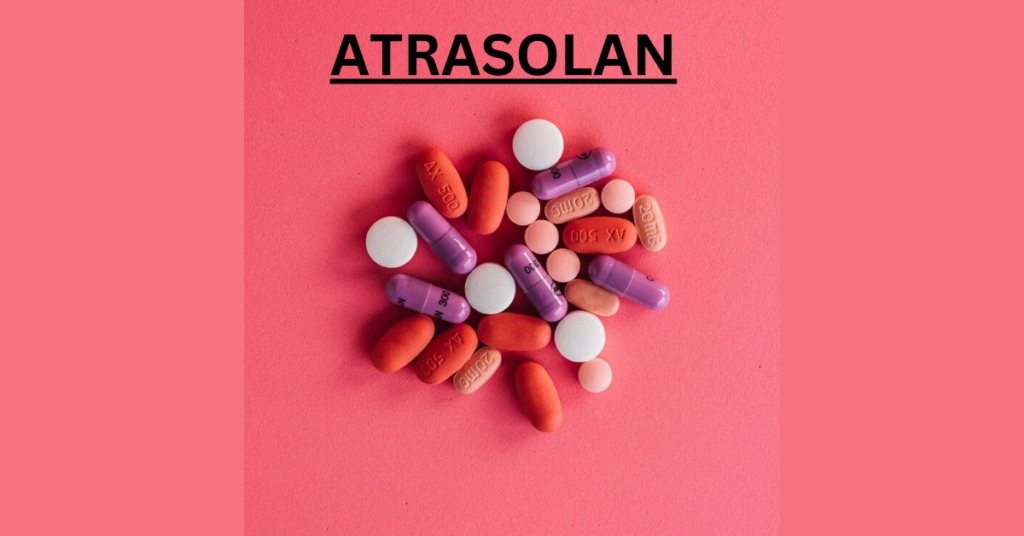Alprazolam, commonly known by its brand name Atrasolan, is a widely used medication for managing anxiety and panic disorders. As a member of the benzodiazepine class of drugs, Alprazolam has been a cornerstone in the treatment of anxiety-related conditions since its introduction. This comprehensive guide will explore the uses, mechanism of action, benefits, potential side effects, and important considerations associated with Alprazolam, helping you understand its role in mental health management.
Overview of Alprazolam
Alprazolam (Atrasolan) is a prescription medication that falls under the benzodiazepine class of drugs. It is primarily used to alleviate symptoms of anxiety and panic disorders. The medication works by influencing neurotransmitters in the brain, thereby producing a calming effect. Alprazolam is available in various forms, including tablets, extended-release tablets, and orally disintegrating tablets.
Mechanism of Action
To understand how Alprazolam works, it’s essential to delve into its pharmacological effects. Alprazolam exerts its effects through its interaction with the central nervous system, specifically by targeting the gamma-aminobutyric acid (GABA) neurotransmitter system.
1. GABA Receptor Modulation
Alprazolam (Atrasolan) enhances the activity of the GABA-A receptors in the brain. GABA (gamma-aminobutyric acid) is the primary inhibitory neurotransmitter in the central nervous system. It plays a crucial role in reducing neuronal excitability. By binding to the GABA-A receptor, Alprazolam increases the affinity of GABA for its receptor, leading to enhanced inhibitory effects. This results in a calming and anxiolytic (anxiety-reducing) effect on the brain.
2. Sedative and Hypnotic Effects
In addition to its anxiolytic properties, Alprazolam also has sedative and hypnotic effects. It can promote relaxation and improve sleep in individuals experiencing anxiety-related insomnia. The sedative effect is particularly beneficial for patients who have difficulty falling asleep due to anxiety or panic symptoms.
Uses of Alprazolam
Alprazolam is prescribed for various conditions, primarily related to anxiety and panic disorders. Its therapeutic uses include:
1. Anxiety Disorders
Alprazolam (Atrasolan) is commonly used to treat generalized anxiety disorder (GAD), which is characterized by persistent and excessive worry about various aspects of life. The medication helps alleviate symptoms such as restlessness, muscle tension, and irritability. By reducing the intensity of anxiety symptoms, Alprazolam can improve overall functioning and quality of life for individuals with GAD.
2. Panic Disorder
Panic disorder is another primary indication for Alprazolam. This condition is marked by recurrent and unexpected panic attacks, which are sudden periods of intense fear or discomfort. Symptoms of a panic attack may include palpitations, sweating, trembling, shortness of breath, and feelings of impending doom. Alprazolam helps manage these symptoms by providing rapid relief during acute panic episodes.
3. Anxiety Associated with Depression
Alprazolam (Atrasolan) is sometimes used to address anxiety symptoms that accompany depression. Patients with comorbid anxiety and depression may benefit from Alprazolam’s anxiolytic effects, which can complement other antidepressant treatments. It is important for healthcare providers to carefully evaluate and monitor patients for any potential interactions between Alprazolam and antidepressant medications.
Dosage and Administration
The dosage and administration of Alprazolam depend on the specific condition being treated, the severity of symptoms, and individual patient factors. It is essential for patients to follow their healthcare provider’s instructions and avoid self-adjusting the dosage.
1. Initial Dosage
For anxiety disorders, the typical starting dose of Alprazolam is usually 0.25 to 0.5 mg, taken three times a day. The dosage may be adjusted based on the patient’s response and tolerance. For panic disorder, higher initial doses may be prescribed, with a common starting range of 0.5 to 1 mg, taken three times a day.
2. Dosage Adjustment
The dosage of Alprazolam is often adjusted based on the patient’s clinical response and the presence of any side effects. Gradual dose increases are typically recommended to minimize the risk of adverse effects and develop an optimal therapeutic regimen.
3. Extended-Release Formulations
Alprazolam is also available in extended-release formulations, which are designed to provide sustained therapeutic effects throughout the day. Extended-release tablets are usually taken once daily and can be beneficial for individuals requiring consistent symptom management.
Side Effects of Alprazolam
Like all medications, Alprazolam can cause side effects. While not everyone will experience these effects, it is important for patients to be aware of potential adverse reactions and to discuss any concerns with their healthcare provider.
1. Common Side Effects
- Drowsiness: Alprazolam can cause drowsiness or sedation, which may affect daily activities and alertness.
- Dizziness: Some patients may experience dizziness or lightheadedness, particularly when standing up quickly.
- Dry Mouth: A dry mouth is a common side effect that can be managed with hydration and oral care.
- Fatigue: Patients may feel unusually tired or fatigued while taking Alprazolam.
2. Serious Side Effects
- Respiratory Depression: High doses or interactions with other central nervous system depressants can lead to respiratory depression, which requires immediate medical attention.
- Dependence and Withdrawal: Long-term use of Alprazolam may lead to physical dependence and withdrawal symptoms if the medication is discontinued abruptly. Gradual tapering under medical supervision is recommended.
- Cognitive Impairment: Some patients may experience cognitive impairment, including memory difficulties or reduced concentration.
Interactions and Contraindications
Alprazolam can interact with various medications and substances, potentially affecting its efficacy or increasing the risk of adverse effects. It is crucial for patients to inform their healthcare provider of all medications, supplements, and substances they are taking.
1. Drug Interactions
- Alcohol: The combination of Alprazolam and alcohol can enhance sedative effects and increase the risk of respiratory depression. Patients should avoid alcohol consumption while taking Alprazolam.
- Other CNS Depressants: Concurrent use of Alprazolam with other central nervous system depressants, such as opioids or certain antihistamines, can lead to additive effects and increased sedation.
- Antidepressants: Some antidepressants can interact with Alprazolam, potentially altering its metabolism or increasing the risk of side effects. Patients should discuss potential interactions with their healthcare provider.
2. Contraindications
Alprazolam is contraindicated in certain conditions and populations, including:
- Severe Respiratory Conditions: Patients with severe respiratory disorders, such as chronic obstructive pulmonary disease (COPD), may be at increased risk of respiratory depression.
- Glaucoma: Alprazolam may exacerbate certain types of glaucoma, and caution should be exercised in individuals with a history of this condition.
- Pregnancy: Alprazolam is classified as a Category D medication during pregnancy, meaning it may pose risks to the fetus. Pregnant women should avoid using Alprazolam unless the benefits outweigh the potential risks.
Benefits of Alprazolam
Alprazolam offers several benefits for individuals managing anxiety and panic disorders. These benefits include:
1. Rapid Onset of Action
Alprazolam is known for its relatively rapid onset of action. It can provide quick relief from acute anxiety and panic symptoms, which is particularly beneficial for patients experiencing sudden or severe episodes.
2. Effective Symptom Relief
For many patients, Alprazolam effectively reduces the intensity of anxiety and panic symptoms. Its anxiolytic and sedative effects can improve overall well-being and quality of life.
3. Versatility
Alprazolam’s versatility makes it suitable for various conditions related to anxiety. Whether used for generalized anxiety disorder, panic disorder, or anxiety associated with depression, Alprazolam can be an effective component of a comprehensive treatment plan.
Challenges and Considerations
Despite its benefits, Alprazolam is not without challenges and considerations:
1. Risk of Dependence
Long-term use of Alprazolam can lead to physical dependence, with patients experiencing withdrawal symptoms upon discontinuation. It is essential for healthcare providers to monitor patients closely and to implement appropriate tapering strategies when discontinuing the medication.
2. Potential for Abuse
Alprazolam has a potential for abuse, particularly among individuals with a history of substance use disorders. It is crucial for healthcare providers to assess the risk of abuse and to provide appropriate monitoring and support.
3. Impact on Daily Functioning
The sedative effects of Alprazolam can impact daily functioning, including driving and operating machinery. Patients should be advised to avoid activities that require full alertness until they are familiar with how the medication affects them.
Conclusion
Atrasolan (Alprazolam) is a valuable medication for managing anxiety and panic disorders. Its ability to provide rapid relief from anxiety symptoms, coupled with its effectiveness in treating panic disorder, makes it a key tool in mental health management. However, like all medications, Alprazolam requires careful consideration and monitoring to ensure its safe and effective use.
By understanding the mechanism of action, uses, benefits, side effects, and potential challenges associated with Alprazolam (Atrasolan), patients and healthcare providers can make informed decisions about its role in treatment. It is important for individuals to work closely with their healthcare providers to develop a personalized treatment plan that addresses their unique needs and circumstances. With proper management, Alprazolam can play a significant role in improving the quality of life for individuals experiencing anxiety and panic disorders.







